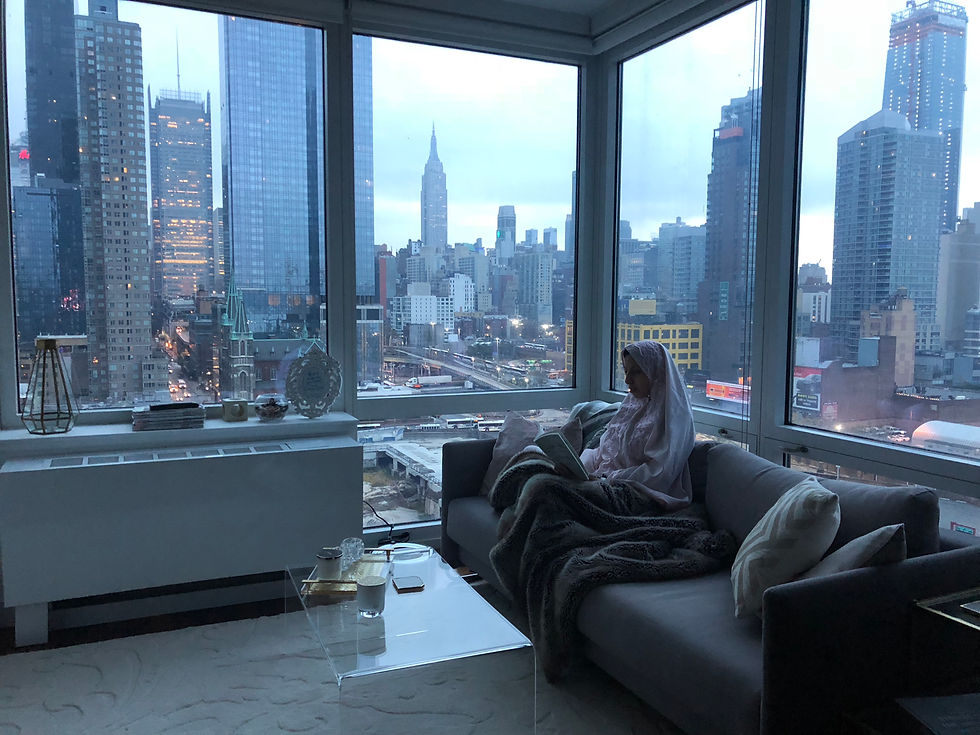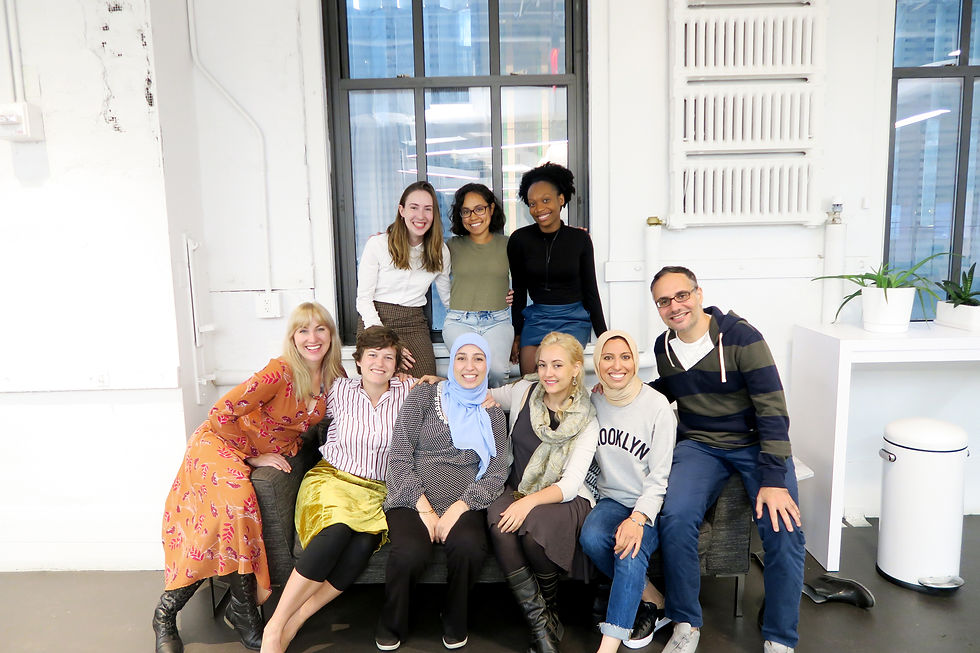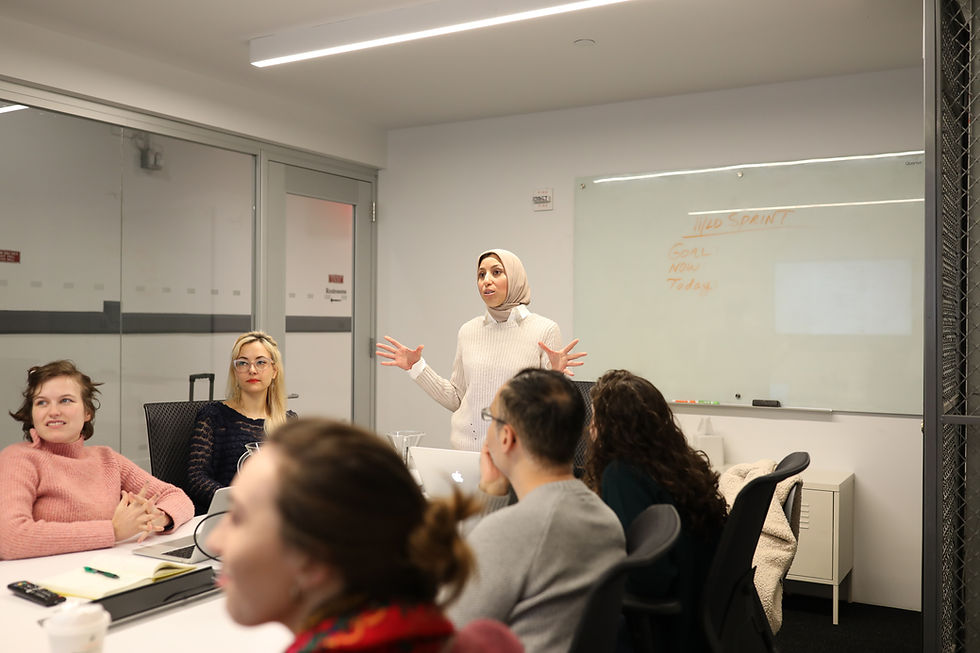Work & Worship: Melanie Elturk, CEO Haute Hijab
- Tayyaba Syed
- Mar 23, 2019
- 5 min read

It has been a heavy week. I have cried randomly while driving, exercising, lying down, being with my kids, studying or cooking. The #50lives of Muslim worshippers lost in New Zealand has left a hole in my heart and soul. They are of us, and we are of them. We’ve all been wounded through this horrific tragedy. Last night I found some solace, though, as I followed the #headscarfforharmony campaign on social media, where the women of New Zealand stood in solidarity with their Muslim sisters and donned the hijab for a day on March 22nd.
They wore our flag of faith and felt a sense of what we go through every time we step out of our homes with it. We’re moved to the frontline. We’re visible. We become the standard bearers of our religion. We’re silently screaming: I believe in God! That may make observers and bystanders uncomfortable, but every second that we wear it is counted in our record as worship. I commend each of you that choose to put yourself out there as a woman of God, a woman of solidarity, a woman of courage.

That being said, I would like to honor my dear friend Melanie Elturk, 34, who has tirelessly worked to normalize hijab in the mainstream. As the CEO and founder of the leading US hijab brand Haute Hijab, she has set out to build a world where every hijab-wearing woman feels comfortable and confident. That is not an easy endeavor. At a time where women are scared to wear it, Melanie is providing hijabs that exemplify beauty, luxury, and quality with confidence. She states that in order to make this a reality, the core of her brand has to be spirituality.
“The value of hijab comes from its essence in spirituality,” shares Melanie, who left her practice as a civil rights lawyer to lead her hijab company full-time. “I am very clear that we are a company for Muslims, and hijab is a mandatory part of the faith. Religion is something that has to be on the table, and we make sure each decision is in line with our teachings and values. Every step for our company involves God and seeking His guidance. He has paved this path for us and has been illuminating the way for us thus far.”
Melanie began wearing the hijab in 9th grade. However, she didn’t understand its spiritual dynamic until college. She recalls the exact moment it happened during her undergraduate studies at Wayne State University in Detroit, Michigan. She watched with white knuckles as some male college students made crude and obnoxious comments at women as they passed by them. However, when Melanie walked past, they put their heads down and didn’t say a word. She realized that day that her hijab was a symbol of respect, and she had just earned it as a woman of faith.
“This is what we’re starting to lose with hijab being commercialized and sexualized,” states Melanie. “We’re falling prey to society’s pressures to look a certain way, particularly our youth. Those men understood that they couldn’t cat call at me. They made that distinction, because I was clearly covered. I wasn’t covering for them, though. I was covering for God. We shouldn’t be so desperate to blend in when Allah has given us this honor and recognition through the hijab.”

Through her brand, Melanie hopes Muslim women feel empowered to wear the hijab as a form of preservation and elevation of their faith. She doesn’t take this responsibility lightly, though, and continuously renews her intentions by turning back to Allah. She maintains a regular worship schedule of getting up at night to pray, staying up after Fajr to read Quran, and constantly making intense du’a for acceptance and blessings in this work and her company.

“We never make a hire in the company (for a Muslim or non-Muslim employee) without praying isthikara first,” Melanie says. “With each product launch, we make du’a about everything. As a Muslim company, ‘mashaAllah’ and ‘alhamdullilah’ are part of our office vocabulary, even for the non-Muslims. We’re also studying Arabic and tafseer together and offering prayers at work. Worship is part and parcel of our work.”
Spirituality has always been an intricate part of Melanie’s upbringing. Her Catholic grandmother was very spiritual and a major influence during much of Melanie’s childhood. The first five years of her life she was actually raised as a Christian.
“My dad is Muslim, and I was born Muslim,” tells Melanie. “However, my mom is a Filipino and Catholic. She used to be very religious like my grandmother, who also lived with us. We went to church, celebrated Christmas and ate pork.”
Melanie shares that her father went to Islamic school as a child in Lebanon but grew up liberal as a result of the country’s political, social and religious landscape in the 1970’s after the overthrow of religion. After her parents divorced, Melanie’s father returned to his faith and left his job as an engineer to become an imam.
“We went from no religion to Christian to super Muslim,” recalls Melanie. “I was 10 or 11 years old, so the transition for me was easier. It was not as easy for my eldest brother, who was 15 at the time. He passed away without accepting Islam, but my other brother Roy does identify himself as a Muslim. I was definitely interested in Islam but wanted to remain true to who I was. I was going to remain the class clown even with the hijab.”
As a youth, Melanie could not always find relatable role models. Her stepmother wore hijab and helped plant a seed in Melanie’s heart to eventually wear it in high school. In law school, Melanie led a girls’ halaqa for high school and college-aged women, majority of whom did not wear hijab. She wanted to know why they weren’t wearing it and discovered two major issues. The first was that it was hard to find beautiful hijabs that made one feel beautiful while wearing it. The other was a lack of role models who were successful and relatable for them, which is what Melanie had experienced as well.
“I look back to where I was and where I am now, and I am truly grateful that God has put a deep love for my faith and hijab in my heart,” says Melanie. “I never wanted to be the ambassador for hijab, but I did want to make it easier for women to wear it. It is not a barrier. It makes us better, and I want to feature incredible women who are religious, successful and stylish. I decided I wanted to help girls and women with the decision to start wearing the hijab by making it accessible. My aspirations go far beyond what we are today. I want hijab to become mainstream and what everyone aspires to practice and feel proud of wearing. If that means I have to work and pray harder to make that happen, I’m willing to do it insha Allah.”


































I’m passionate about modest fashion and love exploring unique styles that combine tradition with modern trends. Recently, I discovered some elegant collections of abaya online USA, and I must say they perfectly blend comfort, style, and versatility.